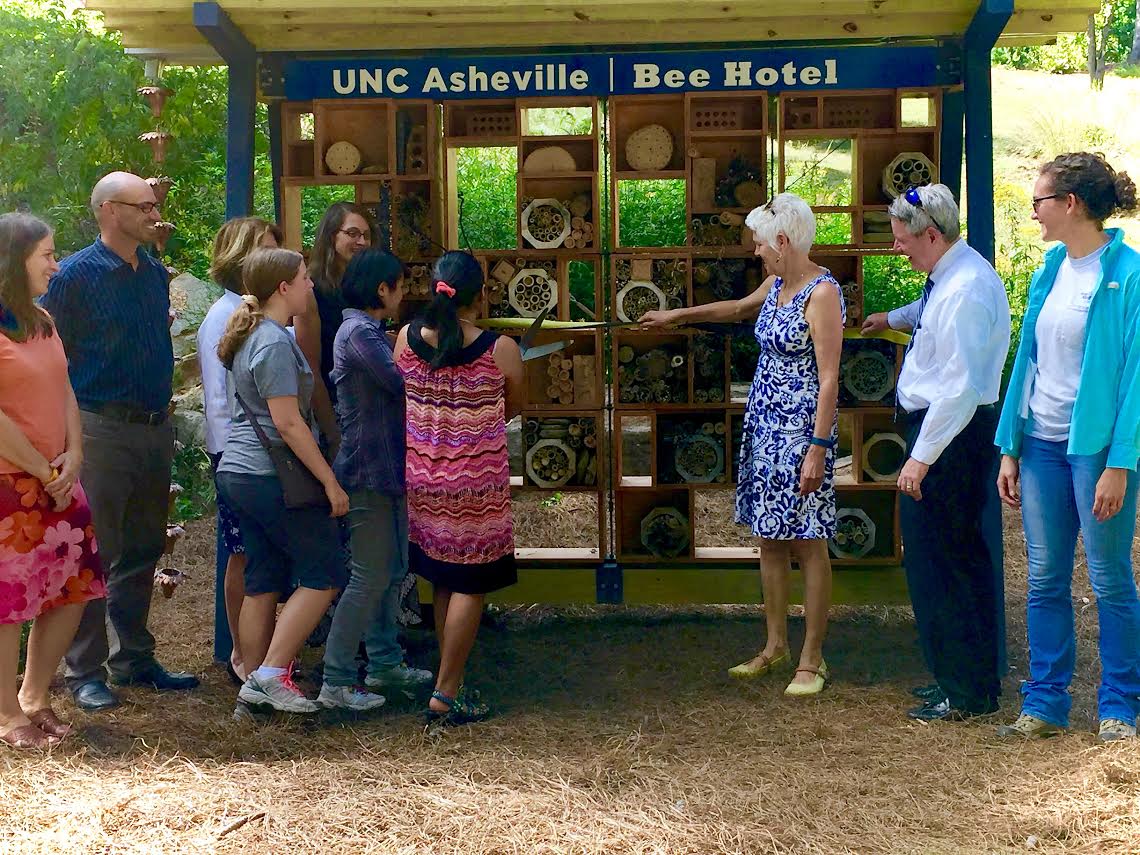
Audra Goforth
News Staff Writer
[email protected]
UNC Asheville community members gathered around the pollinator garden in celebration of UNCA’s Bee Hotel Ribbon Cutting ceremony.
“I hope we use this opportunity as a teaching space, a gathering space, as a place to build community and a way to visualize our values,” said Mary K. Grant, UNCA’s chancellor. “I think that this can do a whole lot over time and we can use this project for on-going research.”
The Bee Hotel, a unique structure of wooden boxes between University Heights and UNCA’s pollinator garden, was a collaboration between UNCA and the Asheville Design Center. After a series of meetings and interviews, ADC selected the Bee Hotel as its annual Asheville DesignBuild Studio program. The official unveiling was on Tuesday, Sept. 13th.
A team of students from both Clemson University and UNC Charlotte, who call themselves Studio Bee, collaborated on the idea of a pollinator habitat and worked together to create UNC Asheville’s Bee Hotel.
Chancellor Grant said she thought the Bee Hotel was a wonderful idea and she supported it from the ground up.
“I loved it when they brought it to me. I thought that it was a really wonderful idea,” said Chancellor Grant. “I loved the fact that it was a visual representation of the important work that has gone on in this institution and this campus for years around sustainability. I loved the partnership of this project and I am grateful for those involved.”
Sonia Marcus, UNC Asheville’s director of sustainability said the Bee Hotel was a $5000 project, but additional contributions were donated.
“I would have to check the exact amount of money invested, but basically there were a lot of sponsoring businesses that gave us materials to use for the project,” Marcus said. “But the whole thing, kit and caboodle, was $5000. That was the limit of what we could spend. Essentially people donated themselves to put the project together.”
Jen Rhode Ward, a UNCA biology professor who worked alongside the Bee Hotel, said the biggest challenge the members of the project faced was picking a proper location.
“The location for this project was one of the most controversial things because the ADC needed it somewhere that would be visible to people, but we did not want to place it somewhere too public,” Ward said.
“This place made for a good compromise,” Ward said. “Bees are relatively insensitive to noise so the traffic disruptions will not disturb them, unlike having people touch and bother them. In addition, the plants from the pollinator garden provide a great food source for them.”
UNCA’s Bee Hotel was constructed of mostly reclaimed and recycled materials. Some of the lumber and cement blocks were left over from past building and remodeling projects, while other materials used were higher grade.
“The structure is made up of mostly steel and wood,” said Jackie Hamstead, environmental specialist at UNCA. “The pros of this is that the structure is durable, but the heaviness is a negative. The wooden blocks are this marine-grade plywood which won’t release any toxins that could be harmful. Nothing that the structure is made up of would bother the bees, we were careful of that.”
Hamstead said the Bee Hotel will need regular assistance annually and students will mostly enforce the labor.
“We will have to change the boxes out. Some of it annually, but most of it every two years,” Hamstead said. “The bee club will help with this, Cathy Whitlock has a pollinator class who will help and the Student Environmental Center has also agreed. It will mostly be student labor.”
These bees do not produce honey and the Bee Hotel serves as a habitat to keep them safe year-round, Hamstead said.
“These bees do not provide honey, but we have honey bee hives on campus near the Sam Miller Complex and roots garden,” Hamstead said. “These bees produce a small, nutritional grain called ‘bee bread’ which the larva feed off of. This habitat is a place where the bees will be safe throughout the year including the colder months.”
Students said they enjoyed their involvement with the Bee Hotel this semester.
“I got involved during the pre-rendezblue program, It’s Easy Being Green,” said freshman, Anna Slayton. “We spent about two hours down here, filling the boxes with mud and twigs, just helping to construct it. It was pretty cool.”
“I am in Cathy Whitlock’s 178 class, Honeybees & Humans,” said freshman Annelise Gummere. “We were down here earlier this week and we worked on filling in the stumps and bamboo with mud to provide habitats for insects. It was a lot of fun, messy, but fun.”
The Bee Hotel is not just a sanctuary for pollinators. The hotel was created to also benefit the UNCA community. Studio Bee created removable informational panels about the project that can be updated and changed over time.
Ward said while this project is a beneficial learning location for some majors, she hopes more departments and students will take advantage of the Bee Hotel.
“So far, environmental studies, biology and math students have been down here visiting,” said Ward. “Those majors are the main focus, but I can also foresee some new media and even art students using the Bee Hotel to get some aesthetics going. We can definitely expand to more than just a few departments and students, that would be ideal.”


![Brooke Pedersen [second from the right] and Luis Reyes [right] hold banners during the Wrap The Woods event.](https://thebluebanner.net/wp-content/uploads/2025/09/ELIZABETH_PRITCHITT_IMG_3470-1200x804.jpg)















